Have you dreamed of growing a lemon tree but just don’t have the climate for it? Fret no more! Today’s post will share all the tips you need to grow a thriving lemon tree even in cooler climates. Learn why you’d want to grow lemons, if it’s worth the trouble, how to overwinter and care for them, and so much more!
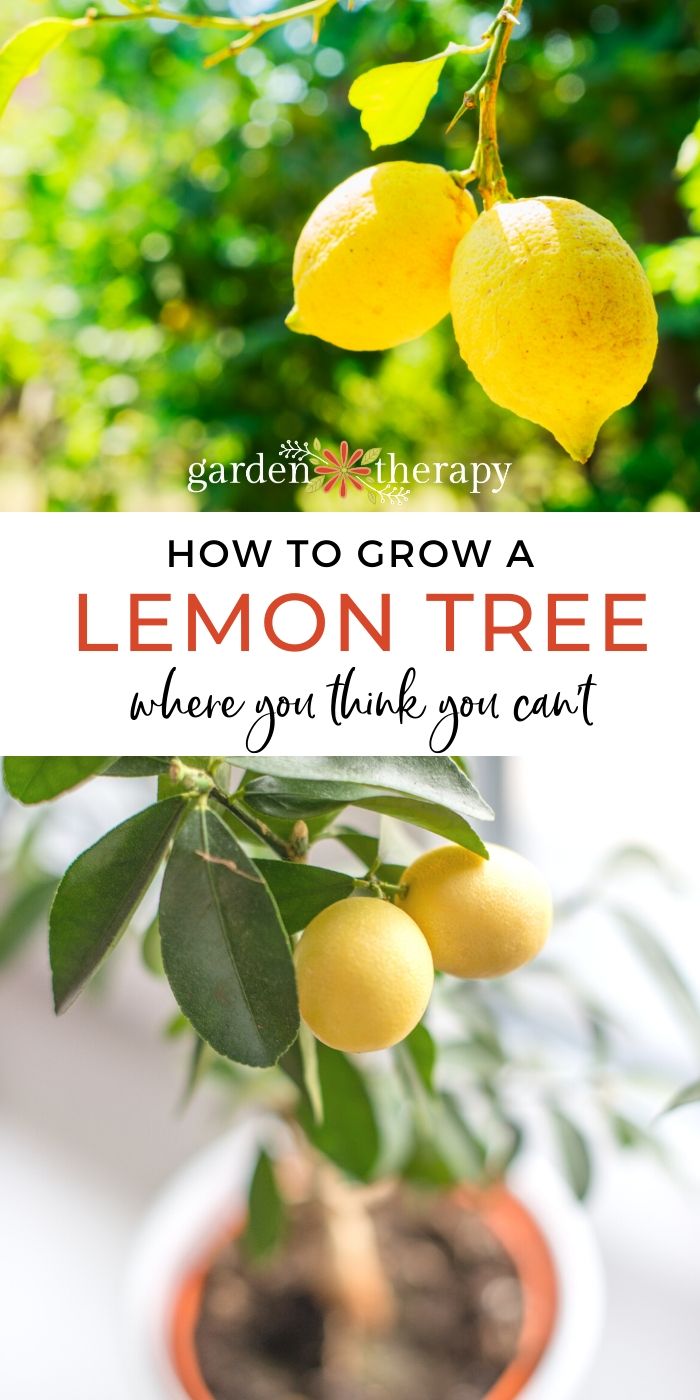
Growing Lemon Trees in Cool Climates
I’m sure that you are well aware that lemon trees are subtropical fruit trees, thriving in sunny, warm climates. They are highly sensitive to frost; however, perhaps you did not know that they are also some of the most forgiving citrus trees.
If you’re a fellow cool-climate gardener and you want to level up your mad gardening skills, growing lemon trees is a fantastic way to reach for the stars, or lemons as the case may be. Those who live in warm, sunny areas may not understand, but growing citrus in cool areas (like Canada) is a big deal!
It takes quite a bit of work but we cherish those little lemon trees. In fact, it’s not uncommon to see a lemon tree dressed up with Christmas lights during the holidays. No, not so they are festive, but because that provides a bit of heat to keep them from freezing.
I have a friend on Vancouver island who lives up on a hill where it’s quite sunny. She’s got a uniquely dry, sunny microclimate, and has been trying to grow lemon trees. She did it—her little lemon tree is budding and she’s thrilled!
Naturally growing outside in hardiness zones 9-11, lemon trees can also be grown as container trees indoors to provide you with fresh lemons right at home. Until fairly recently if your garden didn’t fit those conditions, you just had to shelve your dream of having lemon trees. Until now, that is.
A Guide for Growing Lemon Trees in Colder Climates
I’m thrilled to bring you an interview with Steven Biggs, author of Grow Lemons Where You Think You Can’t. This book is a treasure trove of information that I am positive that you’ll love!
An author and garden master, Steven first made the case for growing fig trees in the colder Canadian climate. Now, he’s back showing us how to grow lemon trees – and providing amazing tips (and recipes!) too.
I first met Steven when we did a Twitter chat together, after which he and his daughter were kind enough to invite me on their podcast, the Food Garden Life Show with Steven and Emma Biggs (you can find our particular episode here). After that, Steven sent me a book he wrote on lemons and I was totally blown away by it! I asked him if he would be kind enough to share some info about his book and growing lemons with you all…and here we are!
I am very happy that Steven tackled this topic because far too often people feel like if they live in a climate where a plant won’t grow naturally, they can’t grow that plant at all. Thankfully as I shared above, it’s not impossible to grow citrus even in the coolest of climates. It just takes a certain know-how coupled with grit and determination.
Read my interview with Steven below to catch some gems that can help you right now. Then grab his book, Grow Lemons Where You Think You Can’t, as your guide for growing lemons.

How to Grow a Lemon Tree Where You Think You Can’t
I couldn’t be more excited to share this information-loaded interview with you. Find out more about Steven, his book, and growing lemons (even in climates you think they won’t grow).
1. Please tell me the story about how you started growing lemons in a cold climate garden. There has to be a story there!
As a student, I spent a summer working at a nursery in England that housed the UK National Collection of Citrus…if you can believe that there’s such a thing! There’s a tradition in the UK of growing potted non-hardy fruit trees—and that summer job introduced me to this tradition, and, in particular, growing citrus in cold climates (and also to figs…but that’s another story).
Fast-forward a few years, and my neighbours, Joe and Gina, asked if I would like their lemon tree when they moved. I was honoured. Joe grew it from a seed in 1967.
My wife, Shelley, was horrified when I put a six-foot-high tree in the window of our tiny living room over the winter…until it started to bloom and the fragrance filled the room!
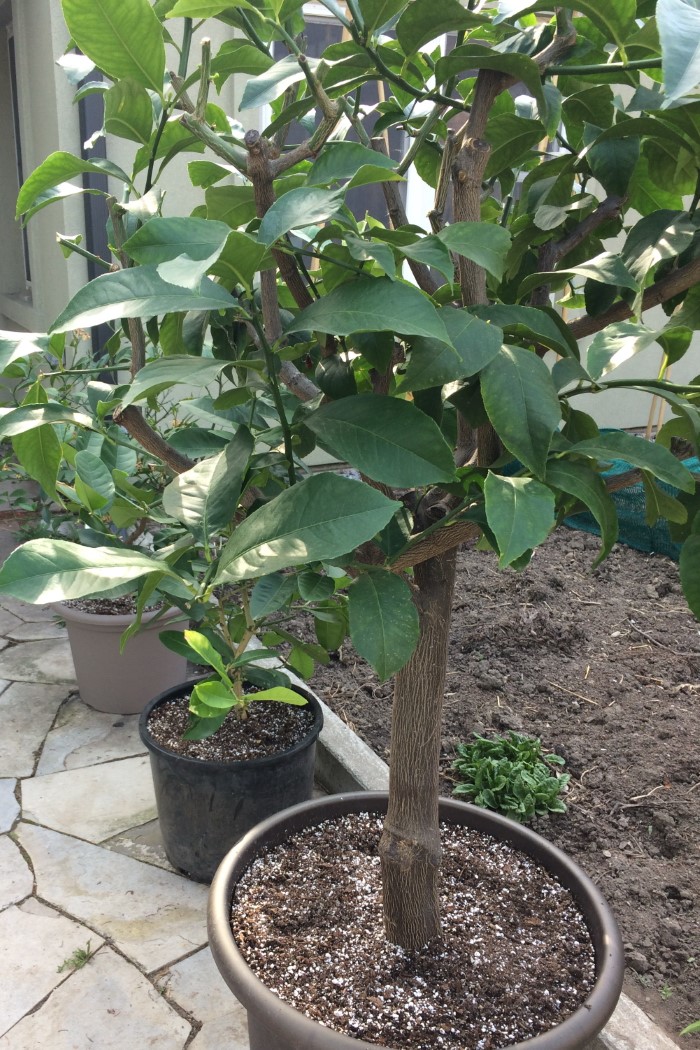
2. I know that lemon trees are sun-lovers. Where do lemon trees grow best?
Lemons grow best in full sun. My potted lemon trees hang out on my sunny patio for the summer. Having said that, it’s important to point out that as home gardeners, we don’t always have perfect growing conditions.
I’ve grown my potted lemons in part sun with very good results.
3. What makes homegrown lemons better than store-bought lemons, or bottled lemon juice?
With a store-bought lemon, you get some juice and zest.
With a homegrown lemon, you get:
- a beautiful container plant
- fragrant flowers that make your house or patio smell amazing
- leaves that impart a delicious flavour when you cook with them—and the juice and zest.
Of course, there’s the freshness of the lemon, too, which anyone who has used a shriveled supermarket lemon will understand!
4. Can you grow a lemon tree from seed? How long will it take to fruit if you grow it from seed?
Yes, lemons can easily be grown from seed.
It’s a fun project for kids to help out with as well.
All you need to do is:
- stick a few seeds into a pot with potting soil
- bury them a centimetre or two down
However, if your goal is to have fruit as soon as possible, I’d suggest buying a plant. That’s because your lemon seedling will go through a “juvenile” stage before it flowers and fruits…and that can take a few years.
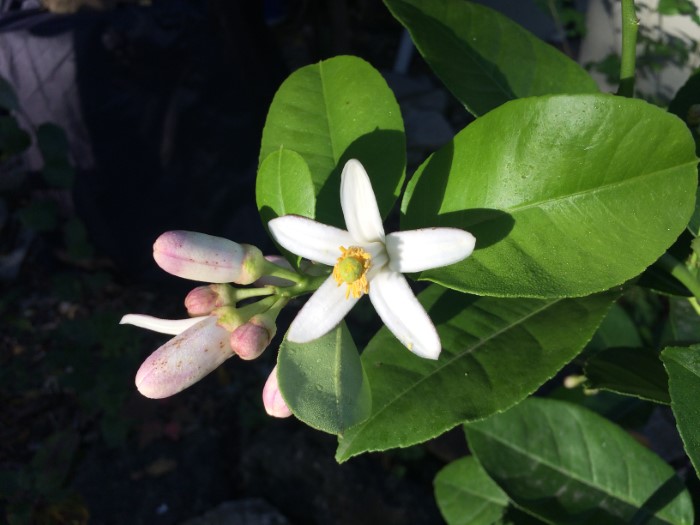
5. How long does it take a lemon tree to grow?
Plants you get at a garden centre are reproduced “asexually,” which simply means that they’re made using wood from a mature plant (usually budding or grafting, like apple trees. See a video of grapfting Japanese maple trees here.)
That means that your little store-bought plant thinks it’s a grownup and is ready to flower right away. How quickly the plant grows depends on the size of the pot it’s given as well if it’s well-fed, and the location.
6. Can you grow a lemon tree indoors? Is it worth the trouble?
Yes, you can grow a lemon tree indoors. It’s worth it if you like the smell of the flowers and cooking with the deliciously fragrant leaves.
I overwintered Joe and Gina’s tree indoors for many years until I changed tactics and started to overwinter it somewhere cold and dark.
Two things to keep in mind if you’re growing indoors:
- It’s rarely as bright in front of a window as it is outdoors—and this can be fine for overwintering. But, if there’s an opportunity to move the plant outdoors over the summer, I would recommend doing that.
- Hot, dry conditions indoors over the winter (from forced-air heating) can give conditions that are ideal for insect pests such as spider mites—so check your plants for pests periodically.
7. What’s the best fertilizer for lemon trees?
Feeding plants is a bit like cooking: Everyone has a personal favourite recipe. Some people like to use specialized formulations for citrus. I’m low fuss when it comes to feeding, so I keep a general-purpose feed that all of my plants get.
The one thing I highly recommend is to look at the fertilizer label to make sure it has micronutrients because that can help prevent a couple of common deficiencies.
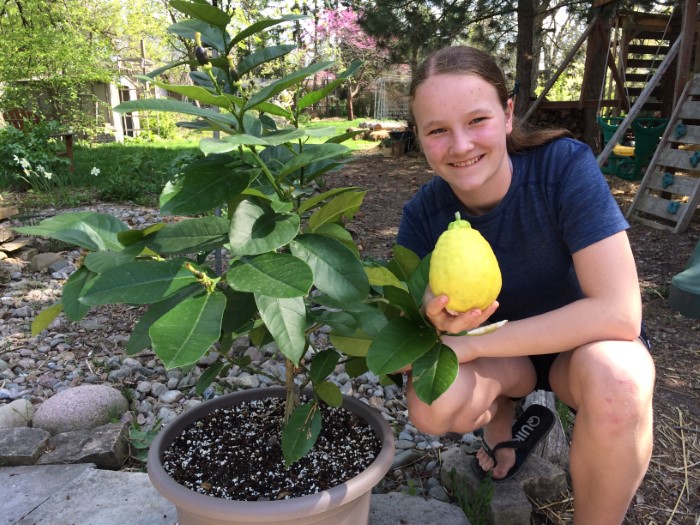
8. How do you overwinter a lemon tree?
There are so many options. These days, I have a cold greenhouse that gets down to just above freezing in the winter. It’s just fine for citrus.
Before I had a greenhouse, I kept them in my cold, dark garage for the winter. (They’re fine without light when it’s cold…they stop growing.)
As I mentioned above, you can bring the plants indoors for winter. And, my favourite idea (which I can’t use here in Toronto because it’s too cold) for more moderate climates is to cover with a string of insulating lights and an insulating cover for the winter.
I have a friend in North Vancouver who gets a great citrus harvest this way.
9. What are your favourite lemon varieties to grow?
Meyer lemon, hands down. It has a compact, bushy growth that makes it suited to growing in a pot. And it’s amazingly productive. It’s actually a lemon-like citrus relative. The taste is milder than a conventional lemon, and the zest has a wonderful taste. (It makes a fantastic sorbet…see below.)
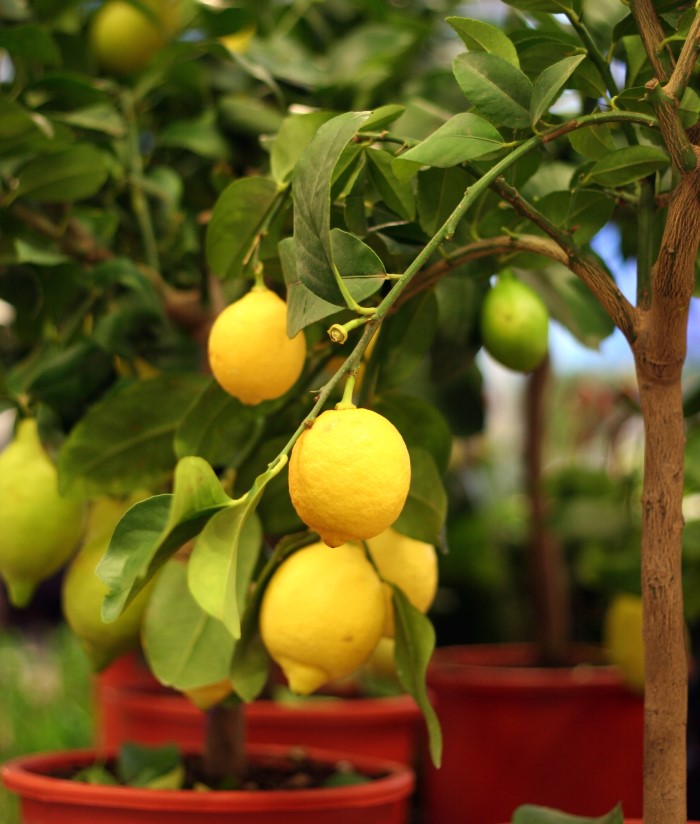
10. What are your favourite ways to use homegrown lemons?
Right now it’s BBQ season, so I’m taking lemon leaves, wrapping them around a wedge of haloumi cheese, and then grilling them on the BBQ. You don’t eat the leaf but it imparts a delicious flavour in the cheese (and I suggest haloumi because it keeps its shape when grilled, and doesn’t melt away).
My other favourite is Meyer Lemon Sorbet.
11. How cold can lemon trees get over the winter?
Lemons can withstand temperatures slightly below freezing.
A few things affect cold hardiness including:
- plant age
- how woody the branches are
- whether plant growth has already slowed down from cool temperatures
But the main consideration? The fruit freezes at around -3°C…so you’d never want to let the tree get colder than that or you’d lose your fruit.
12. What’s the #1 way to kill a lemon tree?
Overwatering is the number one way to kill your lemon tree. Lemons don’t like sopping wet soil around their roots. If you’re not sure whether to water, stick your finger right into the soil in the pot to get an idea of whether it’s still damp lower down.
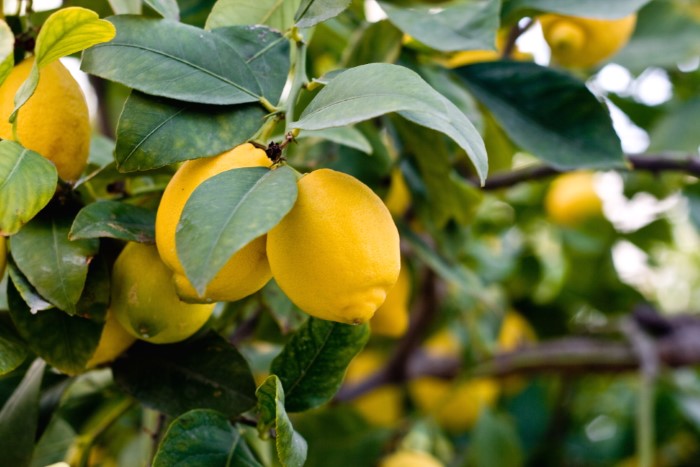
Author Bio
Horticulturist and author Steven Biggs has a passion for incorporating edible crops into the landscape, creating beautiful, edible landscapes with a long and varied harvest. He was recognized by Garden Making magazine as one of the “green gang” of Canadians making a difference in horticulture. His yard includes a driveway straw-bale garden, rooftop kitchen garden, wicking beds, an edible-themed front yard, and fruit plantings. His book Grow Figs Where You Think You Can’t gives cold-climate gardeners many strategies for successfully growing figs.
Learn more about Steven and grab his book Grow Lemons Where You Think You Can’t on his website.
I hope you loved learning more about how to grow a lemon tree right at home – even if you live in a colder climate. I really enjoyed interviewing Steven – thanks, Steven!


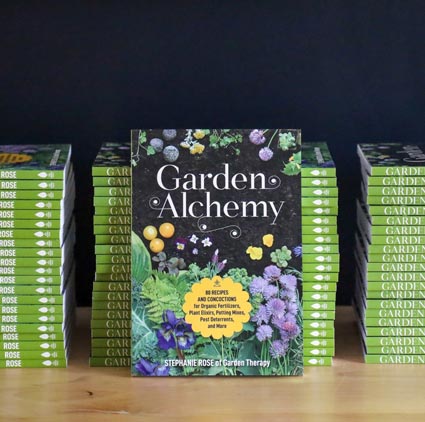


Homegrown Meyer lemons are the absolute BEST! And worth the wait! I had a lovely Meyer lemon tree in a container for about five years. Each year I’d bring it out onto the deck in spring, it would flower profusely and produce about six lemons. I’d bring it inside to a sunny south window in the fall. They took nine months to ripen, but in March when it’s rainy and gloomy in New England, it was a thrill to cut into a ripe, SO JUICY lemon! Unfortunately I lost the plant this year due to a nasty case of “honeydew” and had to toss it. Luckily they’re easy to order online or find in some nurseries.
Hi Stephanie! Thank you for sharing some of my lemon tips and telling people about my book. I LOVE growing lemons and hope that more people try them.
Hey, nice write up! Steven knows what he’s talking about. We lived in Seattle for 3 years and winters can be pretty cold there. Spring doesn’t come as early as in the southern states, so you have to adjust with your gardening schedule. Nevertheless, I managed to grow lemons there, mostly indoors, but I used to put them out during summers. Thanks!
Hi I live in Sudbury, Ontario where it does get cold, and for some sort of reason the winters seem to last forever. I started seedlings from a seed. My question to you is this. If I wrap the little seedlings in burlap and put them in my garden box will they be ok come time to pull them out in the spring time or will they die?
Steven lives in Ontario as well so he has a lot of detailed tips in his book!
Can you dig up a lemon tree that is 3 years old in the ground and put it in a pot . First season of fruit . We live n Cape Town
As with most trees, you need to get as much of the root ball as possible and pot it in a large pot. It should be successful although it might stop fruiting for a short while (maybe a year or two).